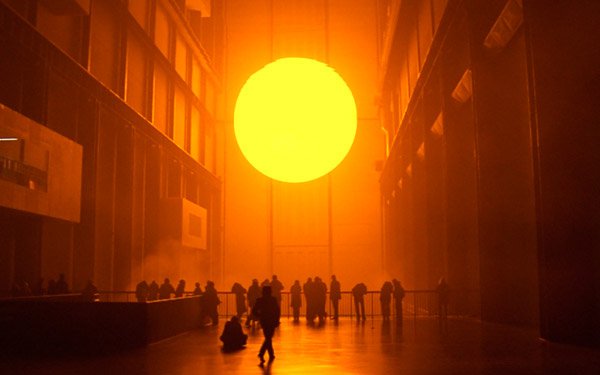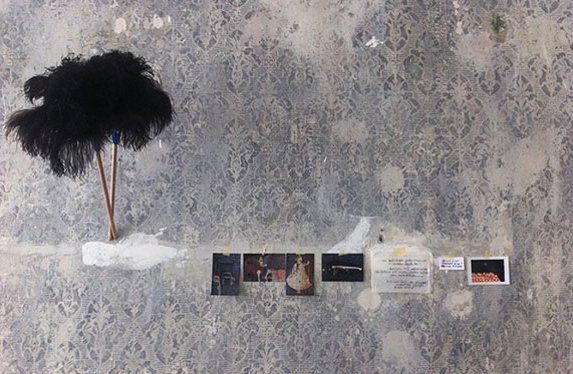Artist Olafur Eliasson in conversation with Bruno Latour and Peter Weibel.
‘Three dimensional space is not a given but the result of a long history through which the spatial characters of a very specific historical definition of what it is to be ‘in the world’ has been entrenched in common sense. Those characters are largely coming from the visual techniques of a highly specific body of paintings and, from there, have been extended to philosophy of science, to technical drawing, to design and to architecture. But this does not mean that organisms do reside in res extensa. It means that it has become difficult for them to follow the thread of experience – including visual experience as demonstrated by Gibson. The interesting question is to check if the general turn to ecology allows one to regain the sense of experience and to redefine space along the lines proposed by Peter Sloterdijk as an artificial envelope.’ Bruno Latour, Space is a Contested Territory
‘Graph Theory is the newest branch of topology, which allows us not only to understand the construction and transformation of spaces, but also above all to understand behaviour in space and the unfolding of spatial parameters. According to Darwin the tree of life is the coral of life. But what Darwin describes as evolution could be seen as a special case of Graph Theory. Topology is therefore a new mathematical tool to better understand the concepts of evolution as spaces of transformation. Newton described the laws of mechanics as the space ruled by the laws of gravity. Lagrange gave us a mathematical model of Newton’s space. Einstein and Quantum Theory redefined the absolute space of Newton as relativistic space-time continuum. Graph Theory as topology continues the work of Lagrange and Einstein into the digital age.’ Peter Weibel, Graph Theory as Topology
Olafur Eliasson is a contemporary visual artist. He attended the Royal Academy of Arts in Copenhagen from 1989 to 1995. He has participated in numerous exhibitions worldwide and his work is represented in public and private collections including the Solomon R Guggenheim Museum, New York, The Museum of Contemporary Art, Los Angeles, the Deste Foundation, Athens and Tate Modern where he created The Weather Project as part of the Unilever Series. Recently he has had major solo exhibitions at Kunsthaus Bregenz, Musée d’Art Moderne de la Ville de Paris and ZKM (Centre for Art and Media) in Karlsruhe and represented Denmark in the 52nd Venice Biennale. In 1995 he started Studio Olafur Eliasson where a team of people, from craftsmen and specialised technicians, to philosophers, architects, artists, archivists and art historians, cooks, and administrators work with Eliasson to experiment, develop, produce, and install artworks, projects, and exhibitions, as well as archiving, communicating, and contextualising his work.
Bruno Latour is a French Sociologist and anthropologist and an influential theorist in the field of Science and Technology Studies (STS). He is Professor at Sciences Po (Institut d'Etudes Politiques de Paris) where he is also the Vice-President for Research. From 1982 to 2006, he has been Professor at the Centre de sociologie de l'Innovation at the Ecole Nationale Supérieure des Mines in Paris and, for various periods, visiting Professor at UCSD, at the London School of Economics and in the History of Science Department of Harvard University. He has written many books including Laboratory Life: The Construction of Scientific Facts (1979), Science in Action (1987), The Pasteurization of France (1988), We Have Never been Modern (1993), Aramis or the Love of Technology (1996), Pandora’s Hope: Essays in the Reality of Science Studies (1999), and Politics of Nature (2004). He has curated two major international exhibitions at the ZKM with Peter Weibel: Iconoclash and Making Things Public.
Peter Weibel is an Austrian artist, curator and theoretician. Since 1966 he has produced conceptual photo-literature as well as audio pieces, texts, objects and actions. At the end of the 1960s, he worked in the field of Expanded Cinema, Action art, performances and film together with his partner VALIE EXPORT. His interdisciplinary activities comprise scientific, artistic as well as literary, photographic, graphic, plastic, and digital works. He was curator of the Neue Galerie, Graz, and Professor at the Hochschule für Angewandte Kunst, Vienna, as well as the commissioner for the Austrian Pavillon at the Venice Biennale (1993–99). Since 1999 he is chairman of the ZKM Zentrum für Kunst und Medientechnologie, Karlsruhe. Peter Weibel lives and works in Karlsruhe.

